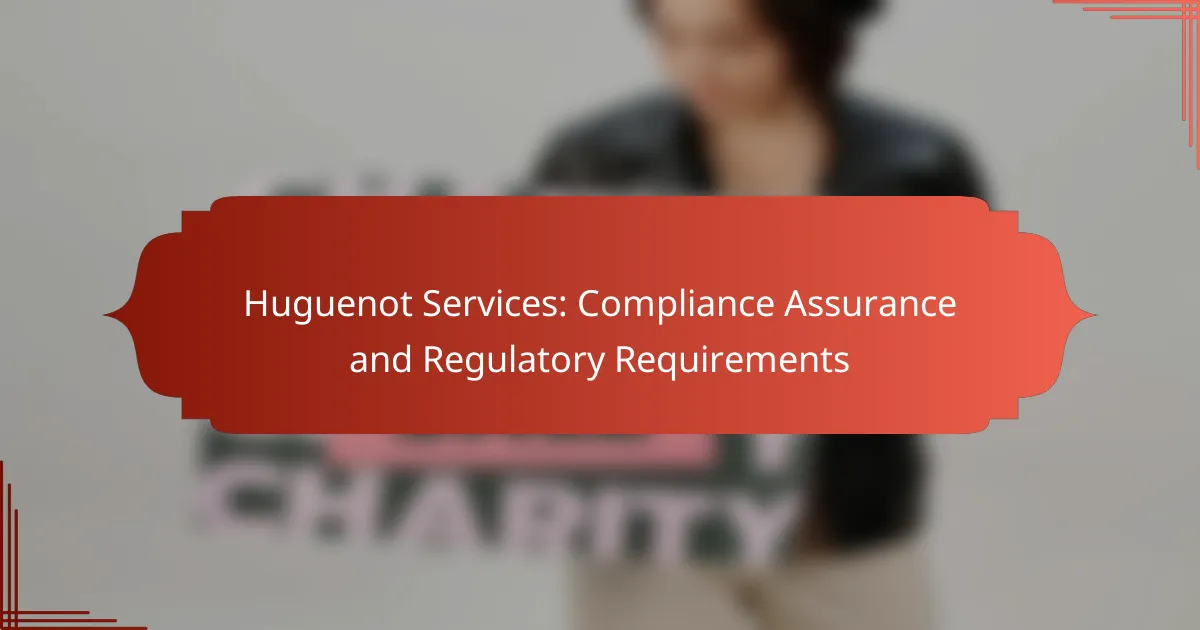Huguenot services in Ireland focus on compliance assurance, helping businesses navigate complex regulatory requirements across various sectors. By ensuring adherence to legal frameworks related to data protection, financial standards, and health and safety, these services play a vital role in minimizing risks and enhancing operational integrity. Selecting the right compliance provider is essential for maintaining industry standards and safeguarding client interests.
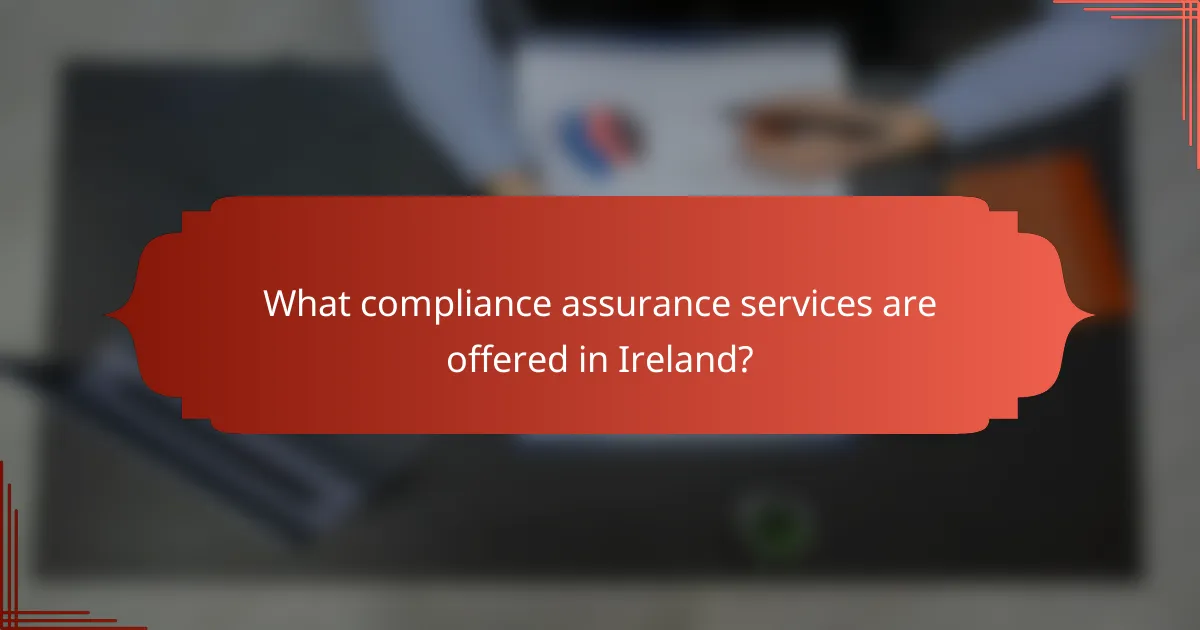
What compliance assurance services are offered in Ireland?
In Ireland, compliance assurance services encompass a range of offerings designed to help businesses adhere to regulatory requirements. These services ensure that organizations operate within legal frameworks while minimizing risks and enhancing operational efficiency.
Regulatory compliance audits
Regulatory compliance audits assess an organization’s adherence to relevant laws and regulations. These audits typically involve a thorough review of policies, procedures, and practices to identify areas of non-compliance. Companies often engage external auditors to provide an objective evaluation and recommendations for improvement.
In Ireland, these audits can cover various sectors, including financial services, healthcare, and data protection, ensuring that businesses meet specific regulatory standards such as GDPR or the Central Bank of Ireland’s requirements.
Risk management consulting
Risk management consulting focuses on identifying, assessing, and mitigating risks that could impact an organization’s compliance status. Consultants work with businesses to develop risk assessment frameworks tailored to their specific industry and operational context.
In Ireland, effective risk management strategies may include regular risk assessments, the implementation of internal controls, and the establishment of a risk culture within the organization to proactively address potential compliance issues.
Training and education programs
Training and education programs are essential for ensuring that employees understand compliance requirements and their roles in maintaining them. These programs can vary from general compliance awareness to specialized training on specific regulations relevant to the organization.
In Ireland, companies often provide ongoing training sessions, workshops, and e-learning modules to keep staff updated on regulatory changes and best practices, fostering a culture of compliance throughout the organization.
Policy development services
Policy development services assist organizations in creating and refining internal policies that align with legal and regulatory requirements. These services typically involve collaboration with stakeholders to ensure policies are practical and enforceable.
In Ireland, well-developed policies can cover areas such as data protection, anti-money laundering, and workplace safety, helping organizations mitigate risks and demonstrate compliance to regulatory bodies.
Compliance monitoring solutions
Compliance monitoring solutions involve the ongoing tracking of compliance activities and performance against established standards. These solutions can include software tools that automate monitoring processes and generate reports on compliance status.
In Ireland, effective compliance monitoring helps organizations quickly identify and address any deviations from regulatory requirements, thereby reducing the risk of penalties and enhancing overall compliance posture.
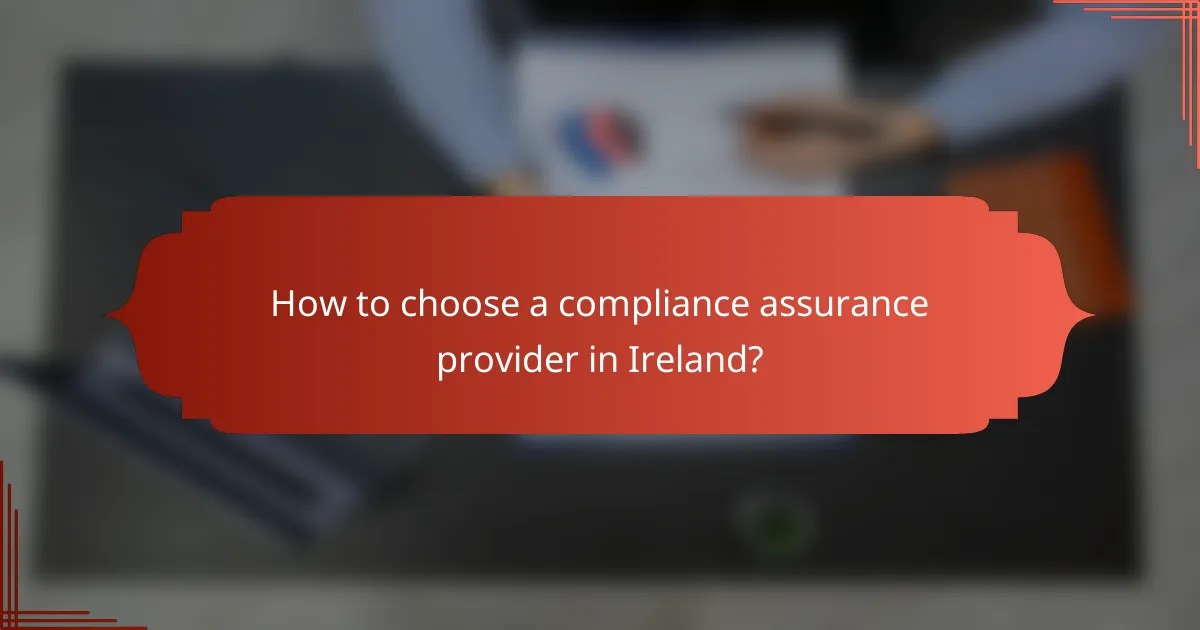
How to choose a compliance assurance provider in Ireland?
Choosing a compliance assurance provider in Ireland involves evaluating their expertise, client feedback, service offerings, and pricing. A well-selected provider can help ensure adherence to local regulations and industry standards, minimizing risks for your business.
Evaluate industry experience
Assessing the industry experience of a compliance assurance provider is crucial. Look for firms that have been operating in Ireland for several years and have a proven track record in your specific sector. Experienced providers are more likely to understand the nuances of local regulations and compliance requirements.
Consider their familiarity with relevant standards, such as ISO certifications or GDPR compliance, which are particularly important in the Irish context. A provider with a strong background in your industry will be better equipped to address your unique compliance challenges.
Assess client testimonials
Client testimonials provide valuable insights into a provider’s reliability and effectiveness. Seek out reviews from businesses similar to yours to gauge their experiences. Positive feedback can indicate a provider’s ability to deliver on their promises and support clients effectively.
Additionally, consider reaching out to past clients directly for their opinions. This can help you understand how the provider handles challenges and their overall client service approach.
Consider service range
The range of services offered by a compliance assurance provider is an important factor. Some providers may specialize in specific areas, such as environmental compliance or financial regulations, while others offer a broader suite of services. Determine what services are essential for your business needs.
For instance, if your company requires ongoing compliance monitoring, look for providers that offer comprehensive packages that include audits, training, and reporting. A provider with a diverse service range can adapt to your evolving compliance requirements.
Review pricing structures
Understanding the pricing structures of compliance assurance providers is essential for budgeting. Some providers may charge flat fees, while others operate on a retainer or hourly basis. Compare these models to find one that aligns with your financial capabilities.
Be cautious of providers with unusually low prices, as this may indicate a lack of quality or experience. Aim for transparency in pricing, ensuring that all potential costs are outlined upfront to avoid unexpected expenses later on.
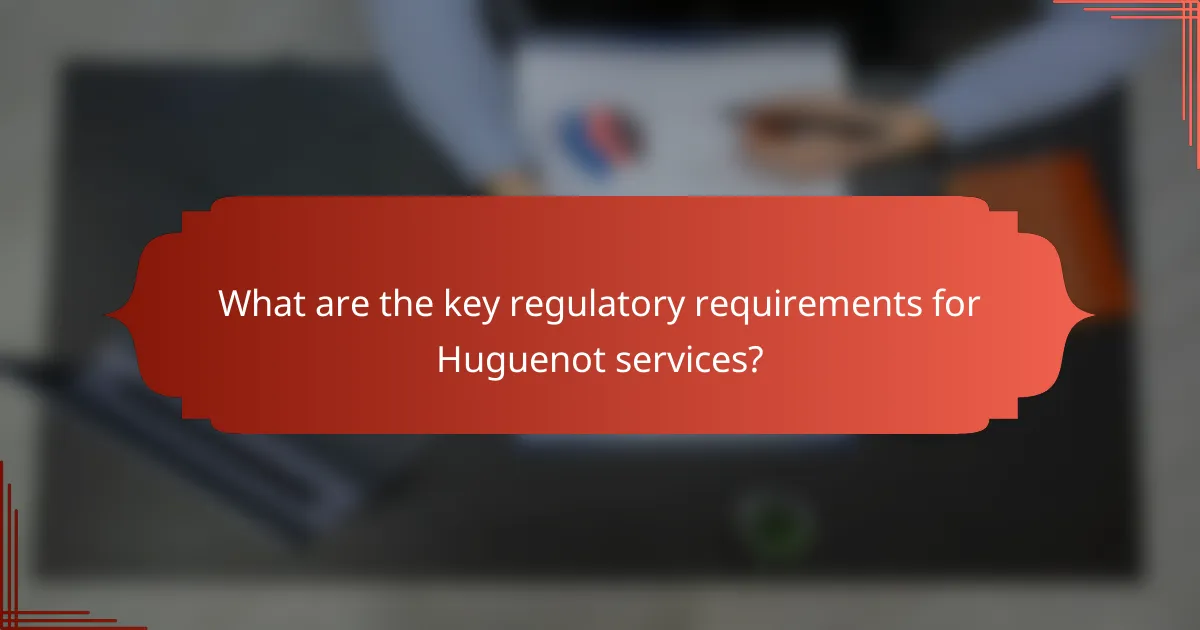
What are the key regulatory requirements for Huguenot services?
The key regulatory requirements for Huguenot services encompass various legal frameworks that ensure compliance in areas such as data protection, financial standards, and health and safety. Adhering to these regulations is crucial for maintaining operational integrity and safeguarding client interests.
Data protection regulations
Data protection regulations are essential for Huguenot services, particularly in safeguarding personal information. Compliance with laws like the General Data Protection Regulation (GDPR) in Europe mandates that organizations implement strict data handling and privacy practices.
Organizations must ensure that they collect, process, and store personal data securely and transparently. This includes obtaining explicit consent from individuals and providing them with rights to access and delete their information.
Financial compliance standards
Financial compliance standards are critical for Huguenot services to maintain transparency and accountability in financial dealings. Regulations such as the Anti-Money Laundering (AML) laws require thorough monitoring of financial transactions to prevent illicit activities.
Companies should establish robust internal controls and conduct regular audits to ensure adherence to financial regulations. This includes maintaining accurate financial records and reporting any suspicious transactions promptly.
Health and safety legislation
Health and safety legislation is vital for protecting employees and clients within Huguenot services. Compliance with local laws, such as the Occupational Safety and Health Administration (OSHA) standards in the United States, ensures a safe working environment.
Organizations must conduct regular risk assessments and provide necessary training to employees. Implementing safety protocols and maintaining proper documentation can help mitigate risks and enhance workplace safety.

What are the benefits of compliance assurance?
Compliance assurance provides organizations with a structured approach to meet regulatory requirements, reducing risks and enhancing overall performance. By implementing effective compliance measures, businesses can safeguard their operations and build a solid foundation for sustainable growth.
Reduced legal risks
One of the primary benefits of compliance assurance is the significant reduction in legal risks. Organizations that adhere to regulations are less likely to face fines, penalties, or lawsuits, which can be costly and damaging to reputation. Regular audits and assessments can help identify potential compliance gaps before they escalate into legal issues.
To minimize legal risks, companies should stay informed about relevant laws and regulations, such as data protection laws or industry-specific standards. Implementing a compliance management system can facilitate ongoing monitoring and ensure that the organization remains compliant.
Enhanced operational efficiency
Compliance assurance can lead to enhanced operational efficiency by streamlining processes and reducing redundancies. When organizations establish clear compliance protocols, employees can work more effectively, knowing the expectations and requirements they must meet. This clarity can lead to improved productivity and resource allocation.
Consider conducting regular training sessions to keep staff updated on compliance procedures. This proactive approach not only fosters a culture of compliance but also minimizes disruptions caused by non-compliance issues.
Improved stakeholder trust
Compliance assurance fosters improved trust among stakeholders, including customers, investors, and regulators. When organizations demonstrate a commitment to compliance, they signal reliability and integrity, which can enhance their reputation in the marketplace. This trust can translate into customer loyalty and increased investment opportunities.
To build and maintain stakeholder trust, companies should be transparent about their compliance efforts. Regularly sharing compliance reports or updates can reassure stakeholders that the organization is dedicated to ethical practices and regulatory adherence.
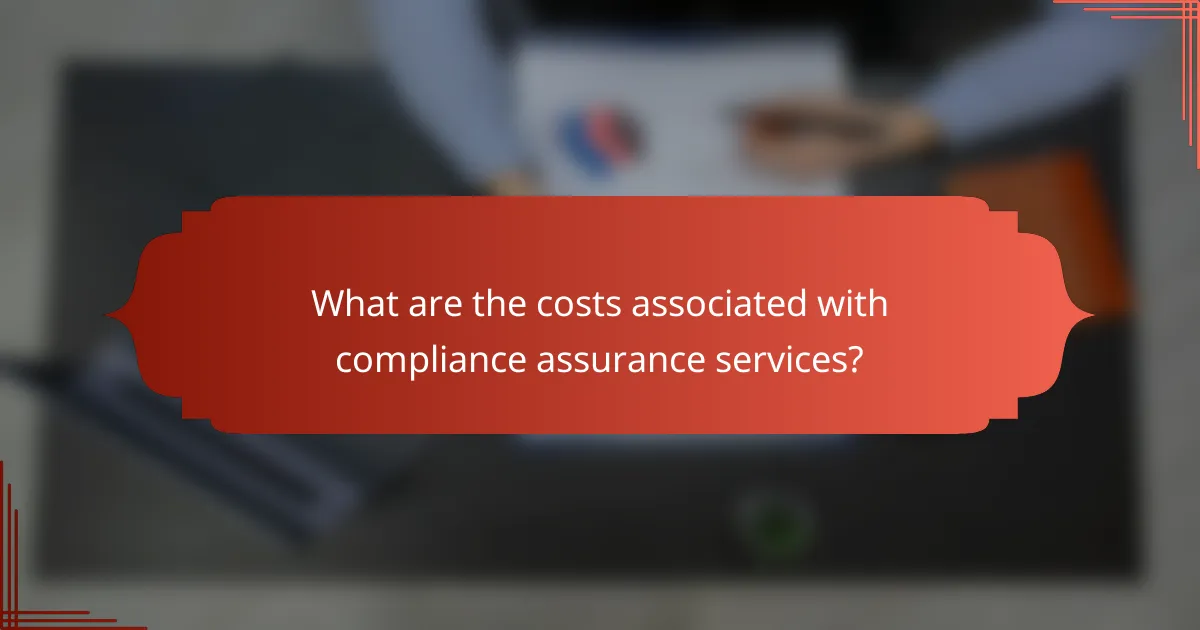
What are the costs associated with compliance assurance services?
The costs for compliance assurance services can vary significantly based on the structure of the service agreement, the complexity of the regulatory requirements, and the specific needs of the business. Understanding the different pricing models can help organizations budget effectively for these essential services.
Fixed fee structures
Fixed fee structures offer a predictable cost for compliance assurance services, which can be beneficial for budgeting. These fees are typically agreed upon in advance and cover a defined scope of work, such as audits or compliance assessments.
When considering a fixed fee arrangement, ensure that the scope is clearly defined to avoid unexpected costs. For example, a compliance audit for a mid-sized company might range from a few thousand to tens of thousands of USD, depending on the industry and complexity.
Hourly consulting rates
Hourly consulting rates are another common pricing model for compliance assurance services. Consultants charge based on the time spent addressing specific compliance issues or providing guidance.
Rates can vary widely, often ranging from around 100 to 300 USD per hour, depending on the consultant’s expertise and the market. This model is flexible but can lead to higher costs if the project extends beyond initial estimates.
Project-based pricing
Project-based pricing is tailored to specific compliance projects, such as implementing a new regulatory framework or conducting a comprehensive risk assessment. This model allows for a clear budget aligned with project milestones.
Costs for project-based pricing can vary significantly based on the project’s scope and duration. For instance, a complete compliance implementation project might cost anywhere from several thousand to over a hundred thousand USD, depending on the regulatory landscape and the resources required.
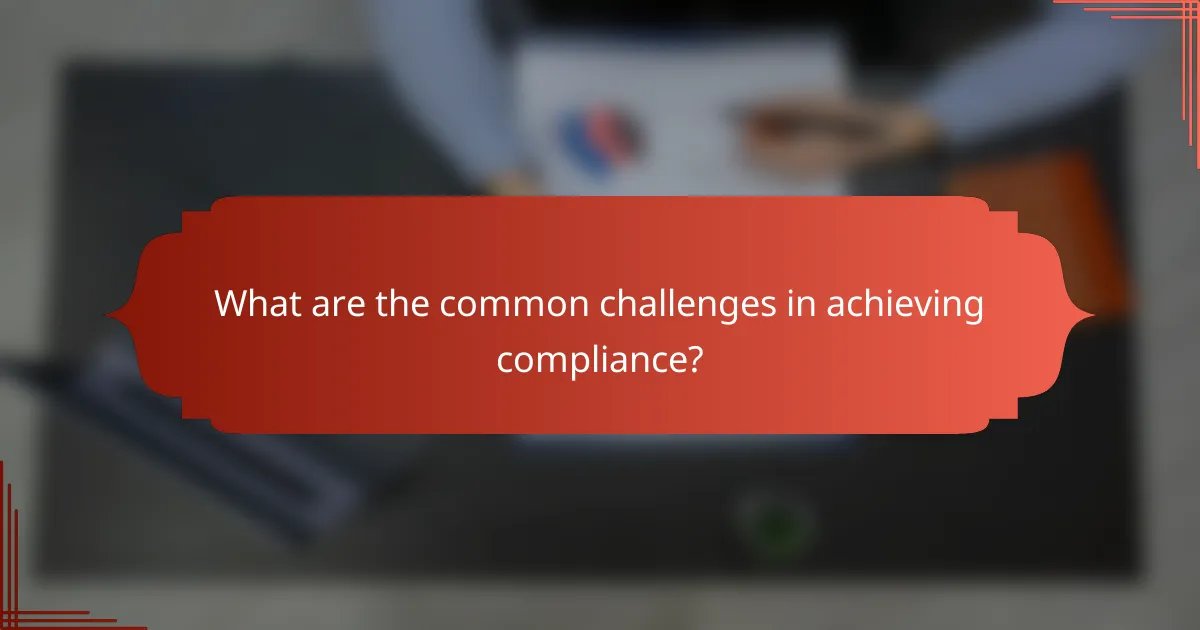
What are the common challenges in achieving compliance?
Achieving compliance often involves navigating complex regulations and standards that can vary significantly by industry and region. Organizations frequently face challenges such as keeping up with changing laws, ensuring employee training, and maintaining accurate documentation.
Understanding regulatory requirements
Regulatory requirements encompass the laws and guidelines that organizations must follow to operate legally in their respective industries. These can include local, national, and international regulations, which may vary widely. Understanding these requirements is crucial for ensuring compliance and avoiding penalties.
For example, a company operating in the European Union must adhere to the General Data Protection Regulation (GDPR), which governs data protection and privacy. Failing to comply can result in substantial fines, making it essential for businesses to stay informed about relevant regulations.
Documentation and record-keeping
Proper documentation and record-keeping are vital for demonstrating compliance with regulatory requirements. Organizations must maintain accurate records of their operations, employee training, and compliance activities. This documentation serves as evidence during audits or inspections.
To streamline this process, companies can implement digital record-keeping systems that allow for easy access and retrieval of documents. Regular audits of these records can help identify gaps and ensure that all necessary information is up-to-date.
Employee training and awareness
Employee training is a critical component of achieving compliance. Staff must be aware of the regulations that apply to their roles and understand the procedures for maintaining compliance. Regular training sessions can help reinforce this knowledge and keep employees informed about any changes in regulations.
Organizations should consider developing tailored training programs that address specific compliance issues relevant to their industry. This proactive approach can help mitigate risks and foster a culture of compliance within the organization.
